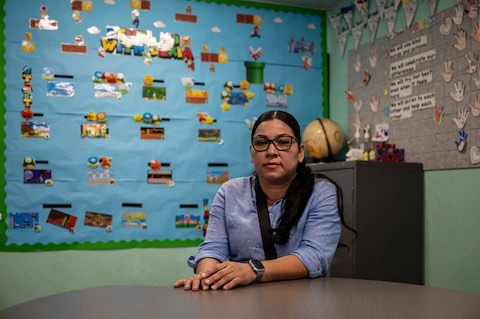
15 Sep New School Year Beset by Teacher Shortages, Anti-Diversity Efforts

“In response to these shortages, states have really lowered requirements for teachers and substitute teachers, and they have even used retired teachers, administrators, parents and even the National Guard to fill vacant positions,” said education professor Tuan Nguyen during an Aug. 18 Ethnic Media Services briefing. (Screenshot captured by Natasha Kaye / The CC Pulse)
By Natasha Kaye
Over the past few weeks, millions of children, teachers and parents geared up for the start of the school year, despite the country continuing to grapple with the myriad of challenges within the school system that may hinder the nation’s children’s ability to learn.
Ethnic Media Services held a national news briefing Aug. 18 discussing these issues at length.
Tuan Nguyen, associate professor in the College of Education at Kansas State University, discussed his research that highlights substantial teacher retention and attrition issues that were exacerbated by the pandemic.
>>>Read: Teaching During COVID Has Me More ‘Stressed, Exhausted and Drained’ Than Ever
Nguyen estimates there are currently 36,000 vacant teaching positions across the United States, many of which are STEM positions with the largest dearth being in Southern states. Due to this massive shortage, schools have resorted to filling many positions with underqualified teachers instead.
“In response to these shortages, states have really lowered requirements for teachers and substitute teachers, and they have even used retired teachers, administrators, parents and even the National Guard to fill vacant positions,” Nguyen said.
According to Nguyen’s research, over the past 12 years, there has been a 40% decrease in interest in individuals pursuing the teaching career. To exacerbate this, there has been a steady decline in individuals pursuing the career, despite completing the teacher preparation program.
>>>Read: ‘We … Put Ourselves Last’: Former WCCUSD Teachers on Why They Left the Classroom
In addition to the dire teacher shortage issue, anti-DEI (diversity, equity and inclusion) initiatives have swept through K-12 schools and higher education. Book bans in schools and public libraries have increased significantly, often targeting works with LGTBQ+ themes as well as classic seminal novels from authors of color that discuss race relations in the United States, according to Dr. Shaun Harper, professor and provost of education and business at the University of Southern California.
Harper said that since 2021, 44 states have introduced legislation to ban the teaching of critical race theory in public schools, and in 18 of those states, some form of the legislation has passed.
“Many states have also put restrictions on the expenditure of public funds on DEI professional learning experiences for teachers, counselors, school leaders, and staff, so it’s not just taking these topics out of the curriculum and out of classrooms, but also taking money out of professional development budgets,” Harper said.
However these anti-DEi initiatives have extended beyond K-12 schools. For instance in Florida, Gov. Ron DeSantis passed legislation to ban public spending on DEI initiatives in colleges and universities in his state, which has subsequently served as a blueprint for other states hoping to follow in his footsteps.
Research from the USC Race and Equity Center, which Harper is the director and founder of, has also discovered that there is a serious lack of discussion or teaching of race in schools to begin with.
“Consistently, over the 12-year lifespan of the center, we’ve heard from teachers and school staff members and leaders that race is a taboo in our schools. We stay away from it in large part because it feels like it may be an explosive powder keg, or we don’t want to make people uncomfortable,” Harper said. “Ultimately, we don’t talk about race in our schools because we don’t know how.”
Harper said the majority of teacher preparation programs require only one course on “multicultural education” in order to become certified. As a result, these classes are often packed to the brim with content regarding race, class, gender and ability and skim over key details on how to discuss and teach race in schools.
Where teachers may lack the ability to discuss these themes, books can fill in some of the gaps, however the increase in book bans further limit the ability for children to engage with these themes in school.
Kasey Meehan from PEN America said 56% of newly banned books are Young Adult books, despite the books already undergoing a vetting process through the publisher, which determines its age classification.
PEN America has recorded over 4,000 instances of individual books banned across 37 states from July 2021 to December 2022.
Much of this push for censorship has come from coordinated group efforts from organizations such as Moms for Liberty and No Left Turn in Education, which aim to challenge the alleged “radicalization” of American schools.
These groups’ efforts coupled with state legislation formally banning these works have resulted in what Meehan has deemed a “chilling atmosphere on education.”
“We also see the way in which vague legislation can empower these local groups and increase intimidation. New legislation introduces penalties for superintendents, educators, librarians, and we see this as another way groups and legislation are chilling the atmosphere of education across the country,” Meehan said.






No Comments